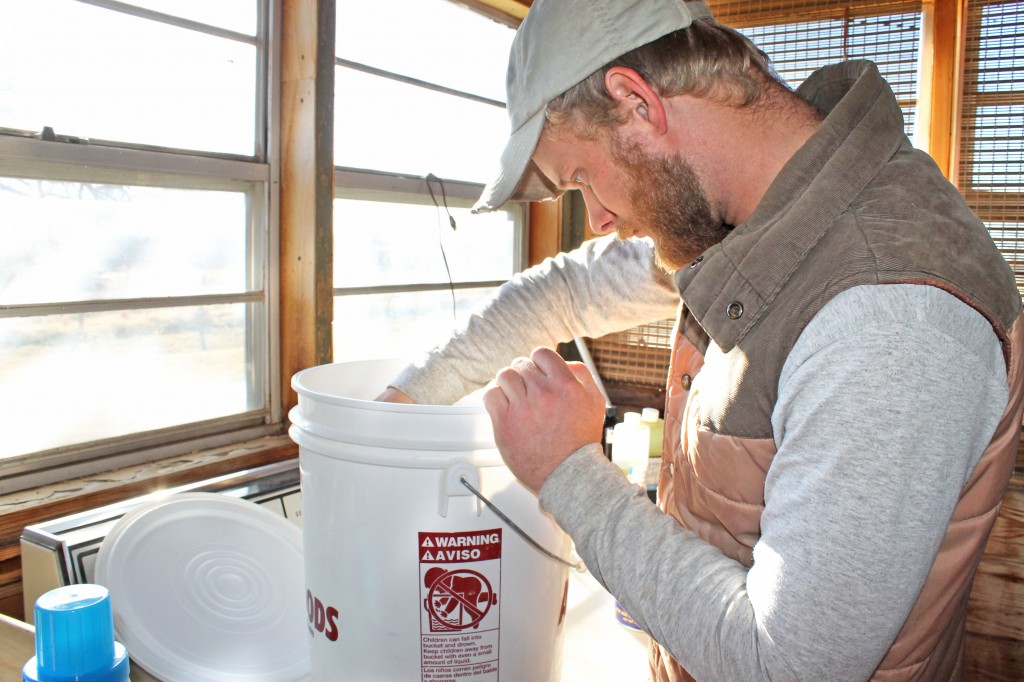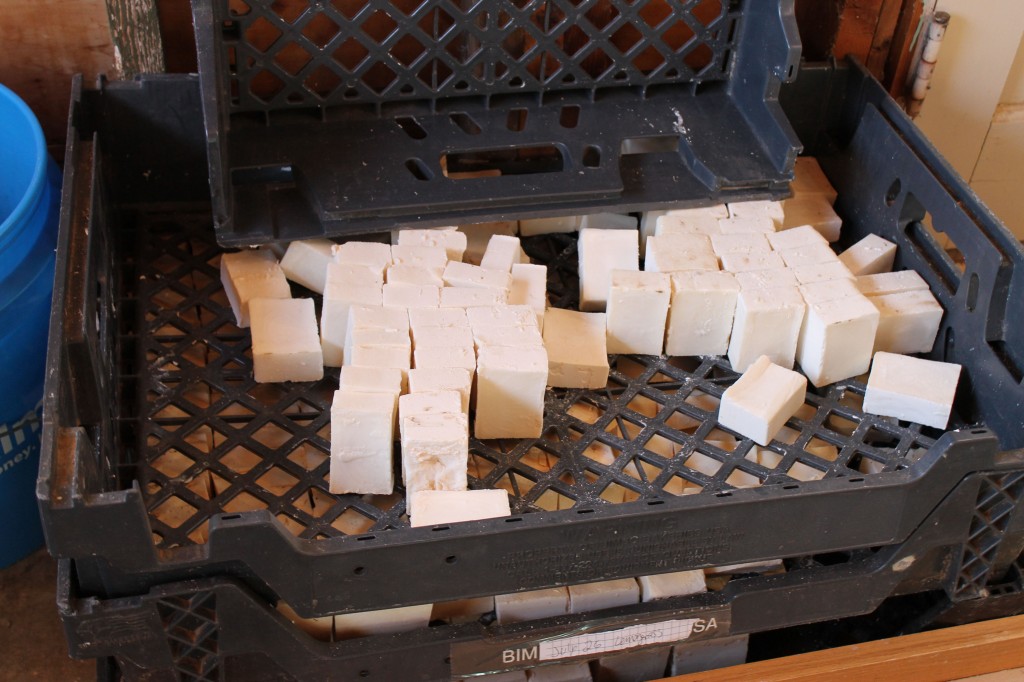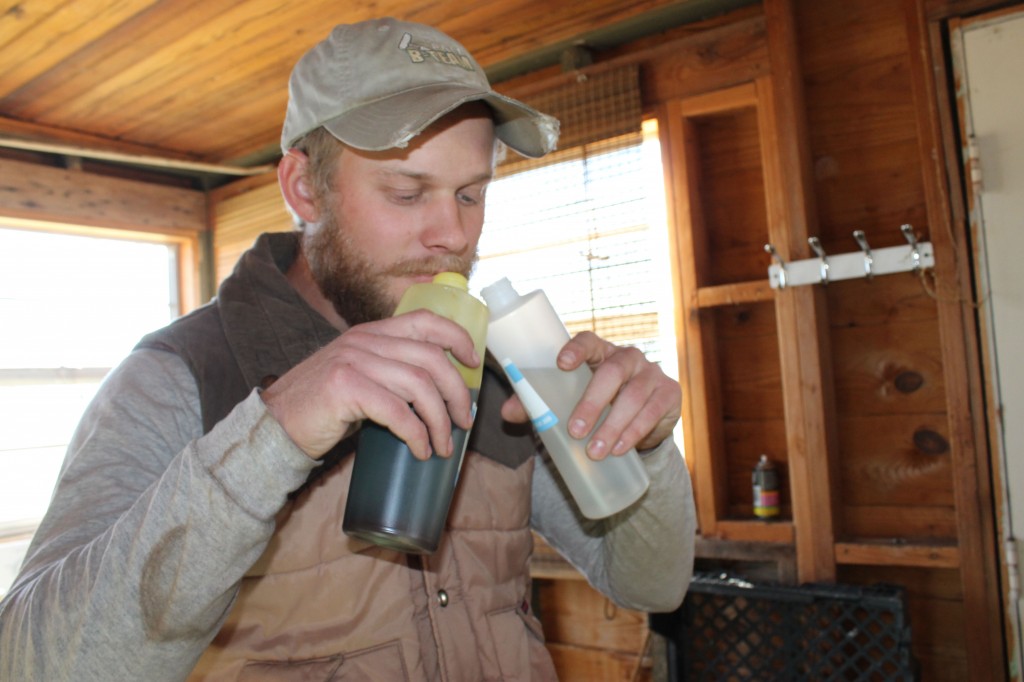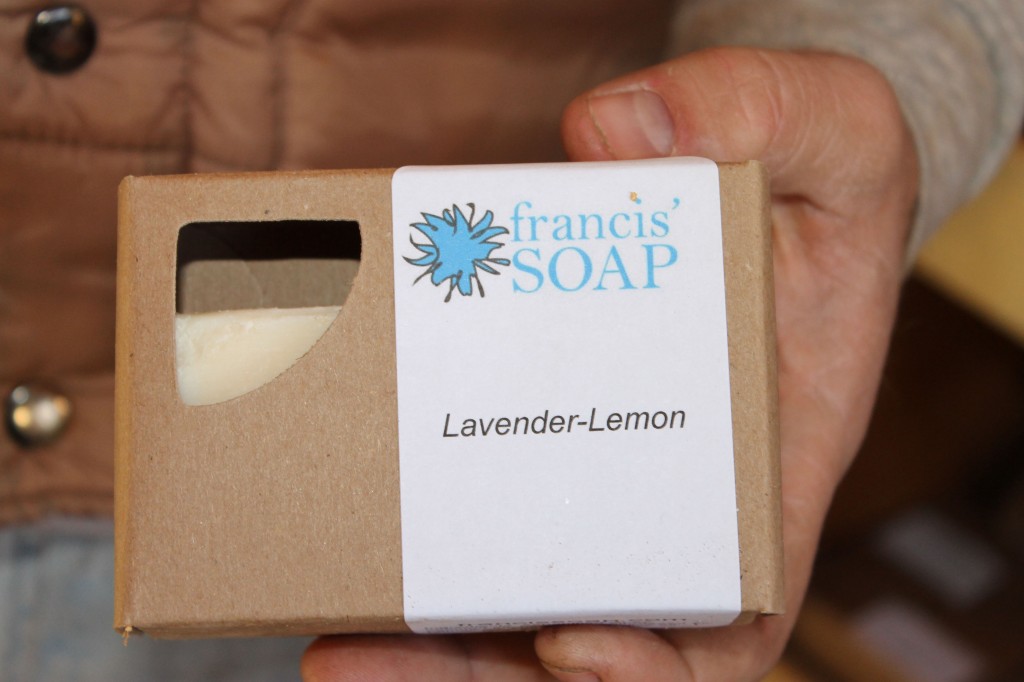Recent marketing graduate finds success in an unusual business venture
“This is the soap your great-grandmother used to make,” said Francis Hamre as he leaned against a mountain bike in his garage-turned-makeshift-soap shop.

Photo by Shanice Glover
In fact, Hamre’s recipe might put great-grandma’s soap to shame with his array of strikingly-scented essential oils he uses to custom-make batches of his whey-based soap.
At 24, the 2011 marketing graduate and former Cycling Team member has made a local name for himself in the art of crafting his own gourmet soap, and he does it all as a one-man-show in a shop at his country home.
Hamre, raised in farming and cattle ranching, got his base of knowledge in curing milk-based products by making cheese from the family cow.
While working in the cheese making business, Hamre noticed something that would launch an entire business plan that he now successfully pursues.
“I noticed that all the workers in the cheese business had extremely soft hands,” he said. “This was due to the workers handing the milk products all day (such as whey).”
Because whey is a natural moisturizer, it made sense for Hamre to find different uses for the product. In fact, according to Hamre, no one has ever attempted to make soap from whey on a large scale.
“There is no limit to the uses for whey,” Hamre explained. “So much whey is leftover after the cheese-making process, and most of it gets thrown away. I figured out a way to take that leftover whey from my cheese production, and turn it into something useful other than dumping it on crops as fertilizer or simply throwing it away.”
Hamre said most mass-produced, over-the-counter soaps sold are not whey- based; therefore, they dry out your skin more easily.
According to Hamre, if a product’s ingredients include items as honey and milk protein, it might contain whey, but there is no real guarantee, because whey-based soap production has never been done on a large scale for mass-production.
“Let’s put it this way,” Hamre said with a grin, “I’m not saying that Suave brand’s “Milk Protein and Honey” soap stole their idea from me, but I researched it, and I actually had the idea before they did.”
Hamre said he was initially told by many colleagues that he should either “go big, or go home” when laying out his business plan.
“This was not the case for me,” Hamre said. “Because I’m a one-man-show, I’ve kept my business small, and been pretty successful doing it. Many people don’t realize the vast competition in mass-producing soap. Plus, you are not going to get the quality of product that you get from me.”
An unusual business plan
While Hamre admits his own business plan goes against the norm from what most big-business marketers try to teach concerning mass-production, doing it his own way has been his best decision.

“Slow production is good,” Hamre said. “They don’t teach you that in school—and it brought me success.”
In fact, after the Times Record News ran a short article about him and his business in early January, Hamre’s stock at Sunshine Natural Foods sold out the very next day, he said.
Hamre has his retail license to sell his soap in Texas, and his soap is available at Sunshine Natural Foods and Alley Cat Collective in Wichita Falls at about $4 per bar.
Hamre also takes online orders at francissoap.com where customers may also request custom batches that he may not offer in his regular stock.
Partnering with
Team Wooly Mammoth
His connections with the cycling team manager for Austin Team Wooly Mammoth helped his expand his business to Austin, San Francisco and even Portland.
In fact, Hamre worked with the Austin Wooly Mammoth Cycling Team to custom make a soap fragrance for the team that they felt represented both a crisp, clean scent paired with a “manly” scent that wouldn’t deem the soap too flowery or “girly” in nature.
The Wooly Mammoth Cycling team chose a scent that was cedar-based with a hint of peppermint.
“I named it Ski Cabin because, in my mind, it’s a scent that one might have while sitting in a wood cabin in the mountains,” he said. “I try to get creative in naming new soaps so that I can capture the essence of what that scent brings to mind each time you smell it.”
Creating the soap
Many times, Hamre uses cedar as his base scent or “low-note,” and will add a “medium-note,” such as lavender, or an “upper-note” like lemongrass.
To keep certain scents discernible from one another he makes different batches of soap, Hamre shared an old trick.

“You take a whiff of coffee grounds in between smelling your essential oils,” he said. “This helps two things. One, it helps clean your “smelling palate” to keep your other scents distinct, and two, it helps to curb nausea from inhaling each essential oil. It can get overwhelming.”
However, Hamre is such as master at his secret recipe, he can pretty much make any order custom-made for a specific client.
According to Hamre, the ingredients he uses in his gourmet soap are the following: lye-water, whey, lard, tallow (cow or sheep fat), coconut oil, sunflower oil, canola oil, cottonseed oil, olive oil and essential oils that add the unique scent to each batch.
“I make 400-450 bars of soap at a time,” Hamre said as he displayed a batch of roughly-chopped, beautifully fragranced bars.
Showing off a large vat for which he melts the oils and fats to a temperature of 100 degrees, Hamre explained that once the heated oils and fats are to just the right temperature, it is then mixed with the lye water in a separate tank.
Afterwards, the mixture is poured into eight molds that Hamre has had specially crafted out of bent rain-gutters. Each mold will yield 50 bars of soap and must rest for two days, creating a “loaf” that is cut into bars,” Hamre explained.
When two days have passed, Hamre moves his “loaves” into a cooler where they will be held for about a month.
“The bars of soap are cooled until they reach an exactly perfect pH so that they are safe for use,” Hamre emphasized.
Other business ventures
Ironically, Hamre describes himself as a cattle-rancher first. He also owns and operates his own lawn and tree-trimming service and sells firewood in the winter.
Hamre is a self-taught soap maker, he said, picking up his skills from a book and creating his own recipes from there.
Hamre attributes much of his success to a particular professor and mentor to him at MSU, Dr. Jeff Stambaugh, assistant professor of management and marketing.
“Honestly, if Dr. Stambaugh hadn’t pushed me to enter my ideas into business plan competitions, I never would have pursued any of this,” Hamre explained.
In fact, Hamre won Idea Wichita Falls, a business idea competition where three winners receive over $66,000 in cash prizes and free access to professional services such as legal, accounting, and marketing assistance, directed by Stambaugh.
Hamre’s business ideas also landed him both first and second place at Idea MSU, a business plan competition sponsored by the Lalani Center so current of former MSU students can hone their business planning ideas and obtain business planning assistance.

“The funny thing is, I won second place for my homemade soap idea,” Hambre said with a laugh. “My first idea was called Cheese Solutions. I would basically travel to different dairy farms and instruct owners and workers how to make their own cheese. At the same time, I could sample other people’s batches of homemade cheese and offer them advice how they can improve their recipes.”
Although Hamre considers himself a cattle rancher first, he admitted while he didn’t necessarily need to use his marketing degree to get a job, he thinks about most of his upper-level marketing courses almost every day when it comes to his business ventures.
“In the real world, you never know what life will throw at you,” Hamre said. “Sometimes you just have to get your feet wet—trust your intuition.”








